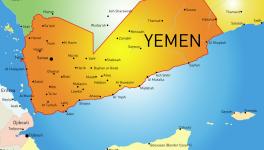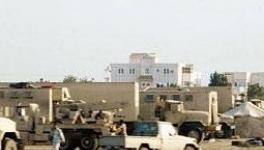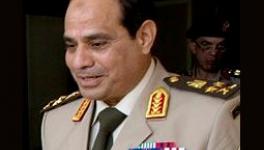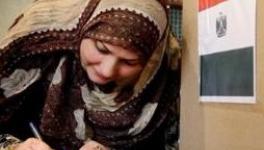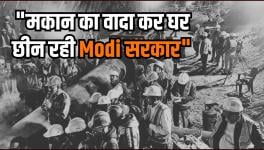Egypt: Military and Brotherhood working for a Dyarchy?
There are three components to the current crisis in Egypt. Right now, the most important, at least in public eye, is who will become the next president of Egypt?
While Brotherhood's Musri appears to have won the vote, without the sanction of the Supreme Council of the Armed Forces (SCAF), he cannot be declared a winner or assume office. The second component is the Parliament, which though elected only last year, has now been dissolved by the Supreme Constitutional Court, probably under the direction of the SCAF. The third is what happens to the Constituent Assembly tasked with writing the new Egyptian Constitution. It was created by the dissolved Parliament. Are its acts, such as the creation of the Constituent Assembly legal, if itself was an illegal body?
There is evidence to indicate that SCAF and the Muslim Brotherhood are in discussions on how to share power. If Mursi is allowed to assume office, he will have to accept an Interim Constitution proclaimed by SCAF a week back that retains most of the powers in the hands of the military. Presumably, the Constituent Assembly would also be a body in which SCAF would then have an overwhelming say, allowing a constitution that enshrines full autonomy from the civilian government on all matters military. The reverse would not however be true – the military would still hold veto powers over the civilian government.
Dissolving the Parliament a few days before the Presidential election run-off where Ahmed Shafiq, the SCAF nominee, would face-off against Mursi, the Brotherhood candidate, was a clear indication that SCAF was not willing to allow Muslim Brotherhood to have control over both the Parliament and the Presidency. Brotherhood, desperate as it is for a share in state power after decades in the wilderness, was clearly willing to wait the issue of Parliament dissolution out till it secured the Presidency. It also sees that given its weakening over the last one year, as shown in the first round of the Presidential elections, it is in no position to take on the SCAF. Therefore, its willingness to negotiate with SCAF. For the Brotherhood, democracy and revolution -- the call of Tahrir – is only for show; what matters at the end of the day is sharing power. And this for them is by negotiating with the Armed Forces and not fighting it on the streets.
By all unofficial estimates, Mursi, the Brotherhood candidate has won by about a million votes. Of the total 25.5 million votes cast, he has secured about 13.2 million against Shafiq's 12.3 million. Yet, various unnamed sources inside SCAF are claiming that Shafiq is likely to be declared the winner. Whether this is a part of negotiating tactics or would really happen, discrediting the entire electoral process and its outcome, remains to be seen.
When SCAF – even if the actual act was carried out by the Constitutional Court – had dissolved the Parliament one week before the Presidential run-off elections, the democratic forces in Egypt had reacted only sporadically. The Parliament dominated by Brotherhood had confirmed that Brotherhood in power would be a completely undemocratic force.
The alarm bells started ringing when SCAF issued the Interim Constitution, arrogating almost all powers to itself till the Final Constitution is written. This brought the democratic forces out again on the streets, with Muslim Brotherhood belatedly joining them.
The reservation about the Brotherhood in the secular and minority ranks still remains. A number of groups called for a boycott of the run-offs unable to stomach voting for either the Brotherhood or the SCAF candidature.
Post the run-offs, the revolutionary groups and the Presidential candidates Fotou and Hamadan Sabahi most closely identified with them, have been discussing with the Brotherhood to hammer out a common ground. The agreement is that there will be a presidential council consisting of Sabahi, Fotou and El Bareidi to help Mursi, the Constituent Assembly will be equally representative of non-Islamists so that it reflects a national consensus, release of political prisoners, purging of ex-regime figures from the administration, etc. El Bareidi may not join the the Presidential Council, preferring to be a neutral figure between the SCAF and the opposition.
So Mursi and the Brotherhood are currently walking a very tight-rope – as they negotiate with both SCAF and the democratic forces. This has been their tactic from the beginning – promising SCAF that they would accept a junior partner role with SCAF commanding the leading position within the Egyptian state, while keeping one foot in the democratic camp.
In this mix, one thing we may be sure of – the US is playing its role of trying to bring the Brotherhood and the Armed Forces into a stable alliance. In the US view, the future in the region lies with a Turkish type, tamed Brotherhood, who would accept the neo-liberal order and the US hegemony over the region for a share of domestic power.
If Shafiq is declared the new President, it would seal the constitutional coup carried out by the military: dissolving of the Parliament and the declaration of the Interim Constitution giving the Armed Forces an overriding role. It would bring back a Mubarak regime sans Mubarak. It would force the Brotherhood and the democratic forces in Egypt into a temporary and an unlikely alliance. The other alternative is to allow Mursi to assume the Presidency, with limited powers and some say over the new constitution while conceding complete autonomy of the Armed Forces and a veto power over the new Constitution.
Who calculates right and who miscalculates is the great unknown. If we read the situation right, Egypt is in for a dyarchy with Brotherhood and the Armed Forces sharing power. Both are willing to take it to the brink but not break with the other. The key question for both is how much power each side – the Brotherhood and the SCAF – is to get.
Get the latest reports & analysis with people's perspective on Protests, movements & deep analytical videos, discussions of the current affairs in your Telegram app. Subscribe to NewsClick's Telegram channel & get Real-Time updates on stories, as they get published on our website.










